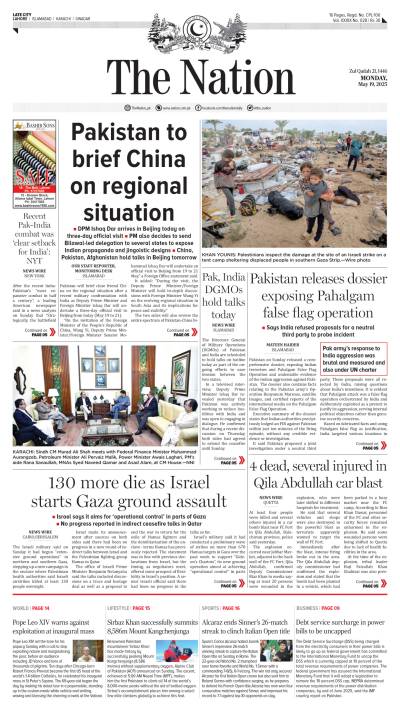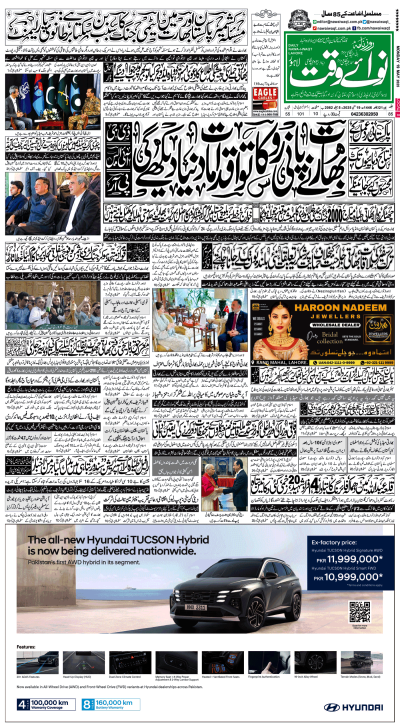An Indian political analyst of the country's foreign policy observed some time ago that it had assumed an "arrogant" style particularly in dealing with smaller nations. If anyone had doubts about the perceptive nature of the remark, he must have become wiser since the unfortunate incidents of November 26 in Mumbai. The way the Indian leaders have been trying to cow down Pakistan neatly fits in with this analyst's observation. The Indians' arrogance issues from their inability to keep within the Gandhian limits of humility the pride that comes with the near fulfilment of a long-held dream of a great and influential global power. In the case of Pakistan, in particular, it is complicated by other factors. The hostility that they entertain towards Pakistan for having torn apart 'Mother India' and assuming an independent entity rankles in their flesh as something that has deprived their country of an even bigger stature and role on the world stage. Whatever twists the apologists of New Delhi's policies towards Islamabad might give, the sense that a large number of Indians treat the creation of Pakistan as an unforgivable crime repeatedly comes out in the open quite sharp and clear. If not specifically referring to the act of partition in this manner, Indians in their contacts with Pakistanis frequently rub in the point that "we are one" with same habits and customs, emotional reactions, kinds of foods and in many case come from the same stock. The suggestive nature of these remarks is not lost on the people here. This very perception that Pakistan has done India great harm also gives rise to a strong feeling among the ruling circles and the sizeable number of fanatical Hindu elements present in the country that it ought to be taken to task for the sacrilege of truncating 'Mother India'. Thus the policy to drive it to the wall. Whenever accusations of a heinous act against Pakistan could possibly hold water in the eyes of international opinion, its propaganda factory goes into full blast. Whether the blame would, in the ultimate analysis, stick is of secondary relevance; the hue and cry and the war hysterics that the Indian leaders and media create would focus the global attention on Pakistan's 'failings' at least for the time being and bring it under intense pressure. The hope is that the pressure compels it to accept the Indian hegemony. That would be, perhaps, the closest the leadership across the border could get to its dream of atoot ang. The 10-month nail biting tension India created in 2002 by concentrating its military might in full readiness on the international borders with Pakistan is a case in point. The attack on its Parliament blamed on Pakistan was the provocation that eased only when the US mounted a diplomatic offensive to ward off a feared nuclear holocaust. Later on, however, the courts in India found Kashmiri freedom fighters guilty Kashmir remains the core dispute between the two countries that periodically brings their mutual hostility in the open. That realisation is now dawning on the world, which has to all appearances reached the conclusion that unless this running sore was removed through a just settlement, the scourge of violence in the region could not be put to rest. If President Barack Obama really wants to see peace prevail here he would have to make serious efforts to take out the root causes of enmity among the different peoples of the region. Success in Afghanistan, Pakistan's tribal belt and elsewhere in the region depends less on a surge in military force and more on an entirely reoriented concept of conducting the War On Terror that concentrates on removing the people's grievances. Another theory about the Indian hype on the Mumbai tragedy, which is making the rounds in Pakistan, talks about the Bush administration's encouragement to India to put it under belligerent pressure so that, in its present fragile economic situation, it is left with no choice but to tamely succumbs to its line in moving against what it believes are safe havens of Al-Qaeda and Taliban terrorists. The idea that militant tribal elements on this side of Afghanistan are a hindrance in the way of the NATO-led forces to carry out their mission might be pertinent for the simple reason that ethnic affiliations and familial ties straddling across the border could rouse anti-US sentiments for brutally suppressing the resistance, including palpably deliberate acts of massacring innocent civilians. One hopes the new American President would also attend to that problem created by the US and solve it through the complete withdrawal of foreign troops and the grant of adequate recompense in the form of reconstruction of the massively destroyed country. The fear of Pakistan's nuclear assets falling into the hands of fanatical forces in the country is also being cited as lying at the root of Indian war cry. The rationale of this excuse, which can hardly bear scrutiny, is to bring Pakistan's leadership to a point where it quietly accepts some sort of an international supervision of its nuclear weapons system. The above three theories are not mutually exclusive and might as well be operating simultaneously. Neither one could deny the Indian designs against Pakistan, nor the US wish for Pakistan to go the whole hog in the tribal areas, nor the feeling in the West and some other parts of the world that Pakistan's nuclear programme should be rolled back. E-mail: mqkay@yahoo.co.uk
Monday, May 19, 2025
Why all this hype?
-
Lahore emerges among safest global cities in Numbeo 2025 index
-
Lahore emerges among safest global cities in Numbeo 2025 index
-
India’s suspension of Indus Water Treaty legally baseless
-
Seventh polio case reported in Pakistan amid nationwide vaccination drive
-
Pakistan reports sixth polio case of 2025
-
PTA begins issuing VPN licences to regulate usage
Regional Reset
May 19, 2025
Peak Potential
May 19, 2025
United Front
May 19, 2025
Culture Shift
May 18, 2025
Tactical Shift
May 18, 2025
Pakistan’s Strategic Edge
May 19, 2025
Lessons for India
May 19, 2025
Galiyat’s Poor Network Services
May 19, 2025
A City in Neglect
May 19, 2025
Rising Cost of Living
May 19, 2025
ePaper - Nawaiwaqt
Nawaiwaqt Group | Copyright © 2025





